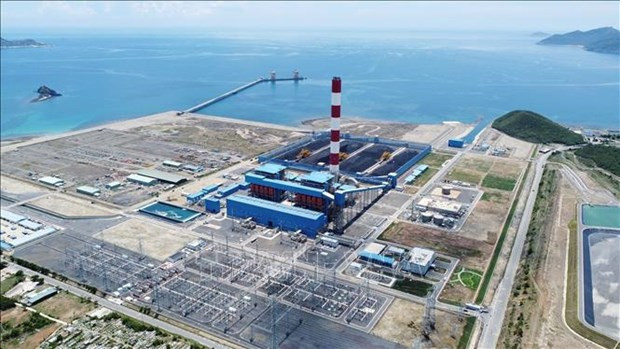
A view of Van Phong 1 thermal power plant (Photo: VNA)
Under Decision 4134 /QD-BTNMT, the HFCs production baseline will be 0 tonne of CO2 equivalents, while the HFCs consumption baseline will be 13,991,360 tonnes of CO2 equivalents. Total national consumption in the period from January 1, 2024 to December 31, 2028 will be 13,991,360 tonnes of CO2 equivalents, it said.
The ministry has assigned the Department of Climate Change to sum up and report the total annual HFCs consumption to the Ozone Secretariat, while submitting to the MoNRE Minister a proposal on the total HFCs consumption of Vietnam in each period.
In Vietnam, one of the strong steps forward in the management and protection of the ozone layer is the legalisation of regulations on ozone layer protection in Article 92 of the 2020 Law on Environmental Protection.
Documents guiding the implementation of the law have clarified contents of the roadmap for management and elimination of HFCs according to Vietnam's responsibilities and obligations to implement the Montreal Protocol, along with sanctions for violations in the field.
The country has joined hands with the international community in protecting the ozone layer, controlling and eliminating substances that deplete the ozone layer, including CFC, Halon, CTC, HCFC, and Methyl bromide, and HFCs which are fluorinated greenhouse gases (GHGs). Vietnam has completely eliminated the consumption of CFC, Halon, and CTC substances since January 1, 2010, and limited the import of Methyl bromide substances which were only used for disinfection purposes.
In the 2020-2025 period, Vietnam will eliminate 35% of baseline consumption of hydrochlorofluorocarbons (HCFCs). Vietnam’s import quota of HCFCs is only 2,600 tonnes, which will gradually decrease in the following periods towards an end of importing HCFCs by 2040.
Vietnam has implemented a roadmap to eliminate HFCs with the goal of not increasing the consumption of HFCs in the 2024-2028 period, eliminating 10% of HFC consumption from 2029 to 2034 and moving towards eliminating 80% of HFC consumption by 2045./.VNA